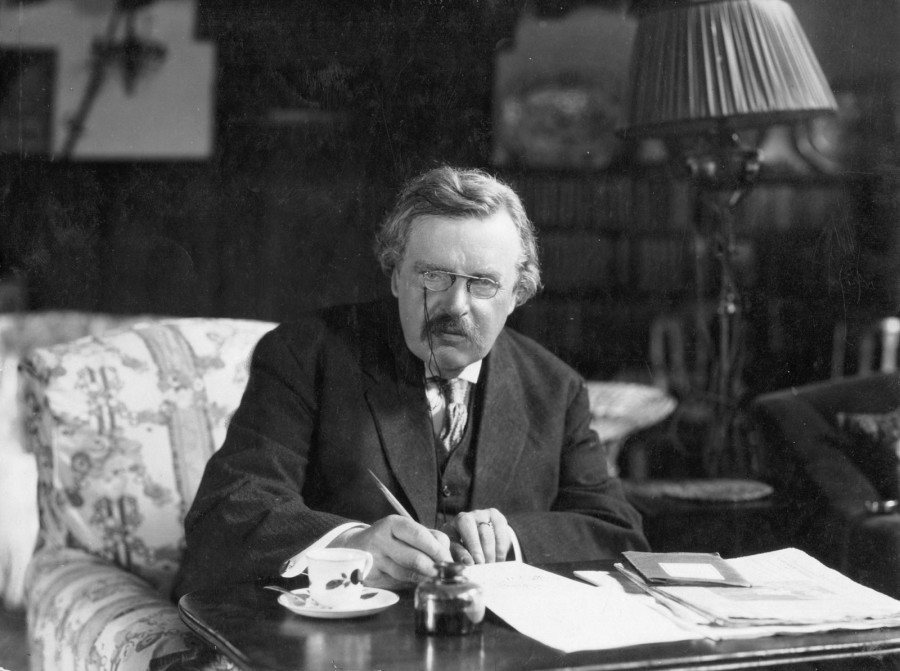Father Brown, a delightful gift of G. K. Chesterton’s imagination (and not to be mistaken with the clever Encyclopedia Brown), is an unassuming genius in a clerical collar with an old ordinary umbrella who at one point in his life was able to summarize any page of St. Thomas’ Summa Theologica. Although Father Brown is (by merit of his consistent appearance in each episode and the fact that the series is named after him), the main character, the spotlight rarely shines on him. Instead, he is the meek voice in the background, or the innocent inquirer during a moment of dumb-founding silence. Simply, Father Brown, isn’t the center of attention in the narration. Nor is he the leading figure in the stories themselves. Father Brown is not the guest of honor or the rallying team captain– and quite naturally so! After all, he’s just a shabbily dressed Catholic priest hobnobbing among society which deems the Church and her God out-of-date, intellectually compromising, and a hindrance to modern progress. Father Brown is not of the majority, the widely accepted, or the socially esteemed. Though the Cross that Father Brown bears barricades the march on modern progress, the Cross mingles in the march to make progress of its own.
In each episode, you’ll find Father Brown speaking the gospel of truth out and among those who deny God and his Church. Actually, among the dozen or so stories I’ve read, never once have I met Father Brown inside a church. In fact, he seems to be everywhere, but the church. It’s in the everyday and obscure places that Father Brown seeks the lost and sinful “among slums and criminals.” Father Brown is a fisher of men catching the criminals in his mystery-solving ministry.
Here are some relevant lessons I think Father Brown can offer to the modern Christian:
- Father Brown never believes someone is beyond the reach of grace. Even to the infamous criminal Flambeau, Father Brown readily extends the option of repentance and reconciliation. As my church’s own priest preached last week, “It is a practice of great faith to believe that anyone– no matter how far they seem to have strayed– can be recalled to new life in Christ Jesus.” In John 11, Mary and Martha send for Jesus to heal their ailing brother, Lazarus. But by the time Jesus and his disciples arrive, Lazarus is already dead and has been at rest in the tomb for four days. When they hear Jesus’ coming Martha meets Jesus and says, “Lord, if you had been here, my brother would not have died.” (11:21) In other words, “You came too late.” But Jesus wasn’t “too late.” Jesus resurrected Lazarus from the dead proving that not even death itself can prevent God from giving life.
- Father Brown does not accuse or judge, yet he is committed to truth. Even after he cracks the mystery, Father Brown does not point a finger at the murder, rather approaches them with the opportunity of confession. Father Brown does not interrogate or prod, but offers himself as a humble listener. By doing so, he invites crooked men to become truth-tellers not just about the genius trick of the crime, but about themselves. It is only when we truly know ourselves, that we know the need for God. As Calvin puts it so plainly, “…the knowledge of ourselves not only arouses us to seek God, but also, as it were, leads us by the hand to find him.” Father Brown offers himself as a listener supporting the soul in the transition from guilt to freedom.
- Father Brown is always ready with the Gospel. He doesn’t miss an opportunity to declare the endlessness of Christian charity and the righteousness of God. Father Brown models for us what it means to practice the readiness which Paul commands of Timothy: “preach the word; be ready in season and out of season; reprove, rebuke, and exhort, with complete patience and teaching.” (2 Timothy 4:2) For the time has already arrived when people do not listen to sound teaching, “but having itching ears” lust to hear the lure of modern progress.





Leave a Reply
Your email is safe with us.